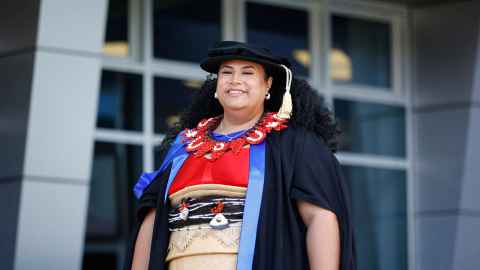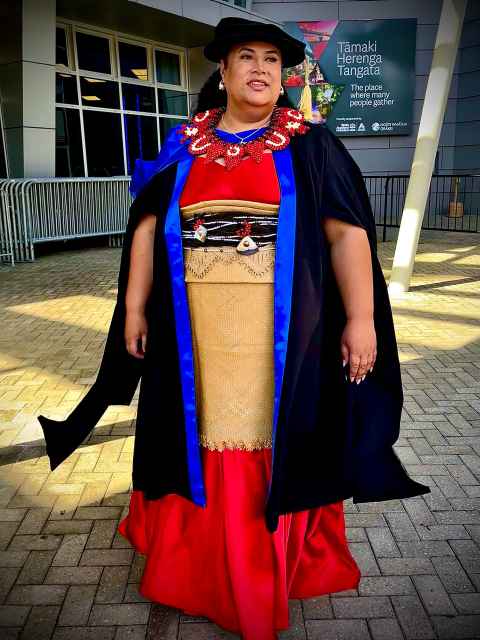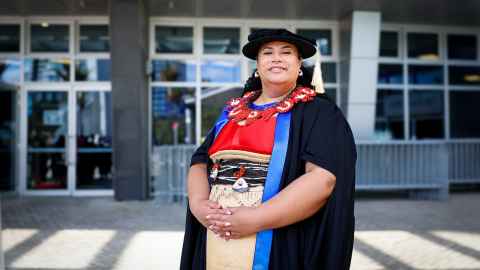Tongan ‘leitī’ experience captured by doctoral graduate
18 May 2025
The need for more comprehensive Pacific Rainbow+ data has been widely acknowledged by academia.

Proudly identifying as leitī – a Tongan whose gender identity and/or expression is additional or different to their assigned sex at birth – doctoral graduate Dr Penni Wolfgramm was striking in red, crossing the stage dressed by Cokana Fashion and makeupwithapi.
The clinical psychologist researched the experiences of Tongan leitī in Aotearoa – a topic close to her heart, with family cheering on as she was awarded a Doctor of Clinical Psychology degree from the University of Auckland on 15 May at the Spark Arena.
Her research looked at the development of leitī’s sense of self and moʻui lelei (well-being) in relation to others from childhood through to adulthood; grounded in Tongan research methods and practices, including the Kakala (garland) research framework, and talanoa with the use of koloa (valued objects and treasures).
“My doctoral research was so close to home, being leitī myself. Hearing and sharing our life experiences has been the most rewarding part of this academic journey.”
The need for more comprehensive Pacific Rainbow+ data within academia has been widely acknowledged by scholars. With a strong presence in the Pacific Rainbow+ community, Dr Wolfgramm advocates for change through her research.
“It has been an incredible journey. I came into this at the sprightly age of 33, truly committed to where I wanted to engage my head, heart and hands – that is with people of colour and particularly, Māori and Pacific communities.
“The highlights of my doctoral research have included taking both the theoretical and practical learning, and considering it through Indigenous Pacific ways of knowing, doing and being.”
Born in Aotearoa New Zealand, Wolfgramm’s parents Albert and Monika Wolfgramm arrived from Tonga; her father from ‘Utungake, Vava’u, and Fasi mo e Afi in Tongatapu, where he lived briefly as a teenager. Her mother was raised in Niutoua, Tongatapu, and also has roots to Kolonga in Tongatapu, Fungamisi in Vava’u and Niuatoputapu.
Wolfgramm’s heritage also extends across the world to Prussia and Germany on her father’s side, and Ireland from her mother’s side.
“I was born here in Aotearoa, New Zealand. I was raised in the south of Auckland Māngere East to be exact – and I still reside here,” she says proudly.
My doctoral research was so close to home, being leitī myself. Hearing and sharing our life experiences has been the most rewarding part of this academic journey.

With family underpinning her academic success, faith was her main pillar of strength while undertaking a doctoral degree.
“God has made all things possible for me and without my covenant with Him, I would have not been able to walk any journey, let alone this academic one.”
Starting out on her doctoral journey as the Covid-19 pandemic hit, threw up further challenges for Wolfgramm to navigate. She had assumed lockdowns would free her of distractions.
“Though I appreciated and was grateful for the solitude at times – it was lonely. Also I was working three jobs at one stage, that took a huge toll. I burnt out at one point.
“That was a really challenging time, those few weeks of my life. But when I look back, I think about what I actually had; it was the three Fs – faith, family and friends. God never left me, I just felt I left Him. So this homecoming opened up so much in my life.”
That period gave Wolfgramm an understanding about what was important in life, and the motivation to acquire the tools to complete her studies.
“Staying in contact with my academic supervisors was so helpful. I look back on so many of the moments where they provided wisdom, and how they also trusted my wisdom and my decisions for my research project,” she says acknowledging Associate Professor Claire Cartwright, Seuta’afili Dr Patrick Thomsen and Dr Fuafiva Fa’alau.
Physical well-being became a priority and spending time with her close friends, but she also recognised the need to look inward as well.
“I took up personal therapy, which I think is a must if you are going to study a Doctorate in Clinical Psychology, or at the very least, to have really good mentoring and professional supervision.”
Receiving financial support from the University and the Ministry of Education made a significant difference.
“This was a complete godsend! It made my job easier in just focusing on writing. I still worked throughout my entire academic journey but that financial support gave me heaps of breathing space – heck, I might still be writing as we speak, if that wasn’t made available.”

The clinical psychologist has barely had time to pause since celebrating the milestone of attaining a doctoral degree. A previous guest lecturer at the University, she will soon teach future medical doctors next semester: the Queering Healthcare course.
She is also the Pacific Rainbow+ Peoples Lead for the Ministry for Pacific Peoples.
“The Village Collective, a Pacific youth organisation in south Auckland, has become a home for me. There I support their Rainbow Fale and practice as a clinical psychologist in their Community Clinic.
“Finally, I will also provide Pacific mentoring and cultural expertise into Project Village Aotearoa, which is focused on exploring the type of support that trans young people and their families need.”
She acknowledged God and the village of people who have walked beside her through the academic journey.
“God has enabled so many of His beautiful people to support me – my siblings, my nieces and nephews and the rest of the gang.
“My friends, especially my dear friend Koya Savea who has been a complete stalwart, encouraging me to keep on keeping on. My Pacific Rainbow+ community – the spaces they made available for me to just be, enjoy our vā, walk through the tough times together. My angels Chrissy and Brooke-Lynn included! My 'DClinPsy' cohort has been a foundation of support through the highs and the lows of the programme.”
As she continues to hold space for her community and performs several roles, Wolfgramm, an early-career researcher, is already thinking about bringing the next generation through.
“Blending policy development, programme delivery, teaching, research, mentoring and clinical practice – through these roles, it’s an honour and a privilege that I am so grateful for.
“What comes next for me is that something may need to give, and I am constantly thinking about making space for other Pacific Rainbow+ researchers and clinicians to come up and come through – fully, authentically and feeling safe and supported.”